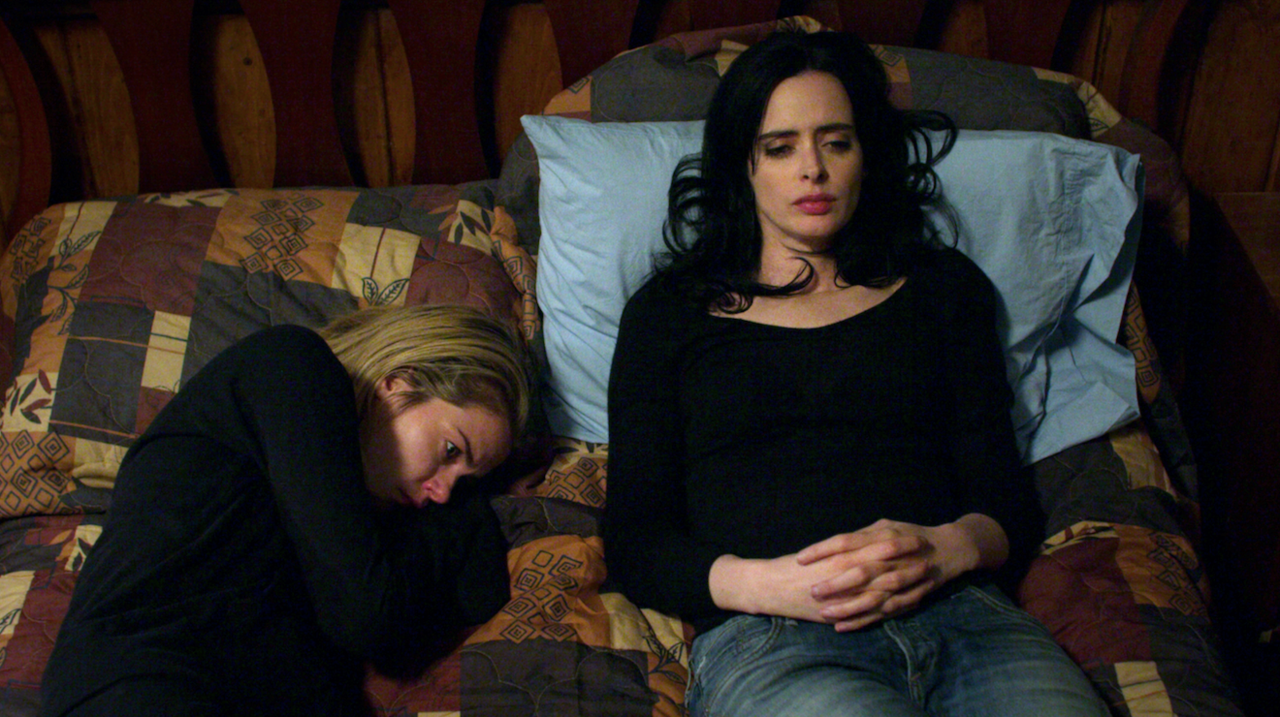The Netflix Marvel shows went through their ups and downs, but now that they're all canceled for good, at least they're going out on a high note with Jessica Jones Season 3.
Netflix sent us eight of the final season's 13 episodes, so this review is based on those alone--although we won't get into any spoilers.
Jessica Jones' first season was one of the strongest shows produced in Netflix and Marvel's partnership, but Season 2 was a major letdown. Even in a world set after the Defenders defeated The Hand--which we had hoped would improve this TV universe moving forward--Jessica Jones' sophomore season didn't hold up, due to issues ranging from poorly written new characters to the lack of a narrative throughline. But like Daredevil's final season, Jessica Jones Season 3 is a return to form--and then some.
As always, Jessica Jones follows the titular super-powered detective as she chases down leads, fights bad guys, and wrestles with her own soul-crushing nihilism. Krysten Ritter remains an inspired casting choice, and her version of this character retains all the complexity she's always had. You want Jessica to get it together, but at the same time, it's hard to argue with her worldview. Almost everything about Jessica Jones' last season is great, but the show really works because of Ritter.
Season 3 is a direct follow-up to Season 2, but in case you didn't watch that--and we can't really blame you--here's a quick recap: Trish (Rachael Taylor) has powers now (she's Hellcat in the comics), but Jessica is mad at her because Trish killed Jessica's mom, who wasn't actually dead like Jessica thought, but unfortunately turned out to be kind of a psycho murderer.
Much of Season 3 is about the possibility of Jessica and Trish's reconciliation. As the audience, you'll want Jessica and Trish to team up, for obvious reasons--they're awesome badasses. But there are plausible reasons why they can't. A lot of the tension this season comes from their relationship, which feels true to life. The direction things are headed at the conclusion of Episode 8--the final episode Netflix sent us--is extremely promising, and the rest of the Season seems perfectly poised to stick the landing.
Unlike Season 2, Jessica Jones Season 3 does have a villain. We won't spoil who it is, because there's a gradual buildup. But even if you're well read in the comics world, you might not know this villain off the top of your head. It's a strange choice, but one that completely works within the world of Jessica Jones. And the casting for said villain--Jeremy Bobb, who we last saw earlier this year in Netflix's time travel dark comedy, Russian Doll--is a wonderfully terrifying foil for Jessica's raw power.

Most of Jessica's side characters are along for this final ride as well. Carrie-Anne Moss is back as ruthless lawyer Jeri Hogarth, who is still dealing with her slowly developing ALS, a disease that will eventually kill her. After the events of Season 2, Jessica's former assistant Malcolm (Eka Darville) is working for Hogarth, doing some things he's not entirely comfortable with. Trish's mom, Dorothy (Rebecca De Mornay), is an irritating presence (as always). And there are some new additions who play interesting roles, particularly Benjamin Walker's Erik, a rare love interest for Jessica.
Jessica Jones Season 3 gets back to what the show is good at: gritty, noir-tinged detective stuff. Despite her powers of super strength and semi-invulnerability, Jessica tends to lay pretty low, using these powers mostly to pry into cases by intimidating suspects or punching through locked doors. And Season 3 is full of that stuff, with great pacing that will make you want to keep watching, at least through the first eight episodes. That said, as was almost always the case with these shows, 13 episodes still feels too long.
This season is also largely concerned with power as a concept--what individuals are willing to do to get it, what they do with it once they have it, and the effect it has on the lives of the people around them. This emerges through Trish's new super-powered activities, but also through Jessica's relationship with her new villain. At least one other powered character is introduced early on, and all three have to make hard choices about the responsibilities of the life they've chosen--or that chose them, in some cases, including Jessica's.
That may sound like typical superhero fare, and in a way, it is--we've seen Season 3's themes and narrative arcs many times before. But when this superhero comfort food is done well, it can resonate with viewers nonetheless. And that's the case with Jessica Jones Season 3.
It's fitting that the Netflix/Marvel universe is coming to an end with a season that reminds us how good these shows were at their best--fitting, and more than a little bit sad. I'm going to miss bingeing these shows a few times a year, because even at their worst, they were watchable junk food TV. At their best, they were much more. I can't wait to watch Jessica Jones Season 3's last five episodes and see how it all will end.